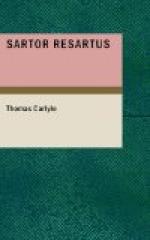Into the Hofrath’s Institute, with its extraordinary schemes, and machinery of Corresponding Boards and the like, we shall not so much as glance. Enough for us to understand that Heuschrecke is a disciple of Malthus; and so zealous for the doctrine, that his zeal almost literally eats him up. A deadly fear of Population possesses the Hofrath; something like a fixed idea; undoubtedly akin to the more diluted forms of Madness. Nowhere, in that quarter of his intellectual world, is there light; nothing but a grim shadow of Hunger; open mouths opening wider and wider; a world to terminate by the frightfullest consummation: by its too dense inhabitants, famished into delirium, universally eating one another. To make air for himself in which strangulation, choking enough to a benevolent heart, the Hofrath founds, or proposes to found, this Institute of his, as the best he can do. It is only with our Professor’s comments thereon that we concern ourselves.
First, then, remark that Teufelsdrockh, as a speculative Radical, has his own notions about human dignity; that the Zahdarm palaces and courtesies have not made him forgetful of the Futteral cottages. On the blank cover of Heuschrecke’s Tract we find the following indistinctly engrossed:—
“Two men I honor, and no third. First, the toilworn Craftsman that with earth-made Implement laboriously conquers the Earth, and makes her man’s. Venerable to me is the hard Hand; crooked, coarse; wherein notwithstanding lies a cunning virtue, indefeasibly royal, as of the Sceptre of this Planet. Venerable too is the rugged face, all weather-tanned, besoiled, with its rude intelligence; for it is the face of a Man living manlike. Oh, but the more venerable for thy rudeness, and even because we must pity as well as love thee! Hardly-entreated Brother! For us was thy back so bent, for us were thy straight limbs and fingers so deformed: thou wert our Conscript, on whom the lot fell, and fighting our battles wert so marred. For in thee too lay a god-created Form, but it was not to be unfolded; encrusted must it stand with the thick adhesions and defacements of Labor: and thy body, like thy soul, was not to know freedom. Yet toil on, toil on: thou art in thy duty, be out of it who may; thou toilest for the altogether indispensable, for daily bread.
“A second man I honor, and still more highly: Him who is seen toiling for the spiritually indispensable; not daily bread, but the bread of Life. Is not he too in his duty; endeavoring towards inward Harmony; revealing this, by act or by word, through all his outward endeavors, be they high or low? Highest of all, when his outward and his inward endeavor are one: when we can name him Artist; not earthly Craftsman only, but inspired Thinker, who with heaven-made Implement conquers Heaven for us! If the poor and humble toil that we have Food, must not the high and glorious toil for him in return, that he have Light, have Guidance, Freedom, Immortality?—These two, in all their degrees, I honor: all else is chaff and dust, which let the wind blow whither it listeth.




